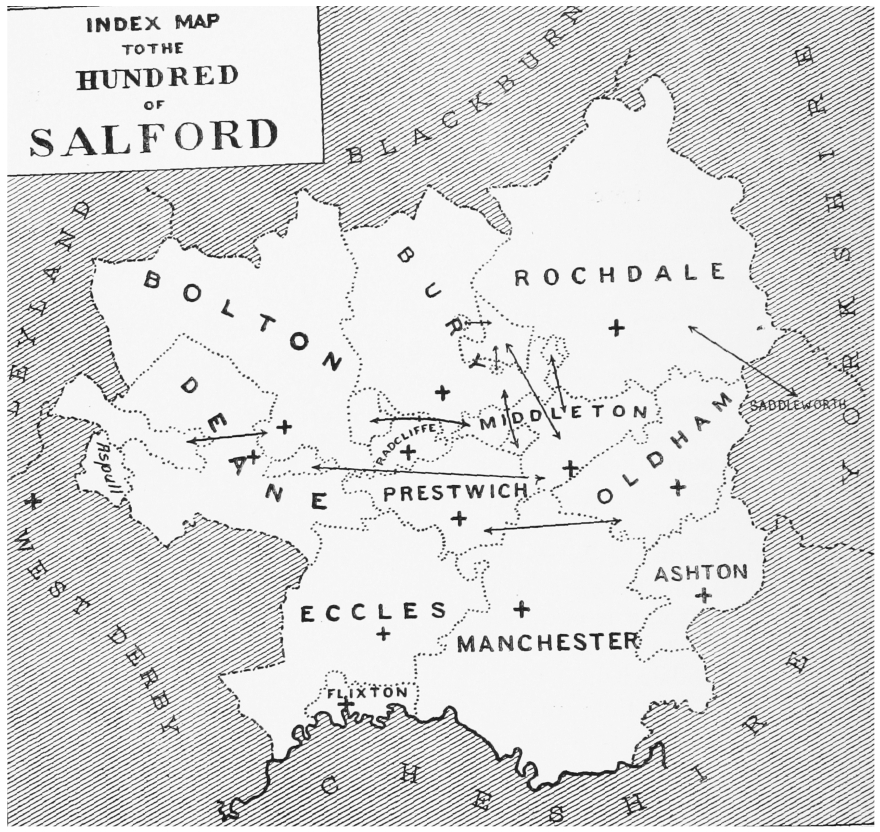A History of the County of Lancaster: Volume 4. Originally published by Victoria County History, London, 1911.
This free content was digitised by double rekeying. All rights reserved.
'The hundred of Salford', in A History of the County of Lancaster: Volume 4, (London, 1911) pp. 171-173. British History Online https://www.british-history.ac.uk/vch/lancs/vol4/pp171-173 [accessed 25 April 2024]
THE HUNDRED OF SALFORD
| containing the parishes of | ||
| MANCHESTER | RADCLIFFE | ROCHDALE (Part) |
| ASHTON-UNDER-LYNE | PRESTWICH | BOLTON |
| ECCLES | BURY (Part) | and the Township of Aspull in Wigan |
| DEANE | MIDDLETON | |
| FLIXTON | ||
In 1066 King Edward held Salford, with its 3 hides and 12 ploughlands, its forest 3 leagues square with many heys and a hawks' eyry, and a hide in Radcliffe, where a second hide was held as a royal manor. The churches of the manor of Manchester had a plough-land in Manchester. The rest of the 'manor or hundred,' including Rochdale, was divided into twenty-one berewicks, held by as many thegns, assessed as 11½ hides and 10½ plough-lands, with extensive woodlands. The whole manor rendered £37 4s. for farm of the plough-lands. In 1086 the demesne was worth 100s.; there were two ploughs and serfs and villeins with one plough; and by the grant of Roger of Poitou five knights held 3 hides and 7 ploughlands, in which were thegns, villeins, and others, including a priest, having thirty-two ploughs; and the whole was worth £7. (fn. 1) The area was probably much the same as that of the existing hundred. (fn. 2)
The lordship of the hundred followed the same descent as the district anciently known as 'Between Ribble and Mersey,' (fn. 3) and with the honour and Duchy of Lancaster is now vested in the Crown. Nearly a third of the hundred continued to be held in thegnage, as the survey of 1212 shows, the parish of Rochdale being so held of the lord of Clitheroe; the principal military tenant at that time was the baron of Manchester, other prominent holders being the lords of Penwortham and Tottington—whose fees were acquired in the first half of the 13th century by the Lacy family and afterwards incorporated in the honour of Clitheroe—and the lord of Great Bolton. (fn. 4) These feudatories did suit to the hundred court of Salford from three weeks to three weeks. (fn. 5)

INDEX MAP TO THE HUNDRED OF SALFORD
The administration was committed to a serjeant or bailiff. (fn. 6) In 1436 the king gave Sir Richard Molyneux of Sefton the office of Steward of the Wapentake of Salfordshire, to descend by hereditary right; (fn. 7) by virtue of which grant the Earl of Sefton is the present high steward. The courts were formerly held at the Town Hall, Salford, (fn. 8) the ancient jurisdiction having been regulated and extended by an Act passed in 1846; (fn. 9) but they are now held in Manchester.
In 1237 a subsidy of a thirtieth of movable goods produced £81 7s. 8½d. for the hundred and £493 9s. 2d. for the whole county. (fn. 10) In 1332 the levy of a fifteenth of movable goods yielded £39 4s. for this hundred and £287 13s. 8d. for the whole county. This became the basis of the 'fifteenth,' amounting to £41 14s. 4d. for the hundred and £329 16s. 4d. for the county, which was regularly levied until the imposition of the Land Tax in 1693. Under the provisions for the levying of that tax at the rate of 4s. in the pound on the profits of land and 6 per cent. on personal estate, the valuation of this hundred amounted to £5,438 12s. 10d., that of the whole county being £21,265 16s. 8d. (fn. 11)
According to the certificate of a general muster made in 1574 this hundred supplied of furnished men 60 archers and 294 billmen, and of unfurnished men 72 archers and 309 billmen; total 735, out of 4,870 provided by the whole county.
